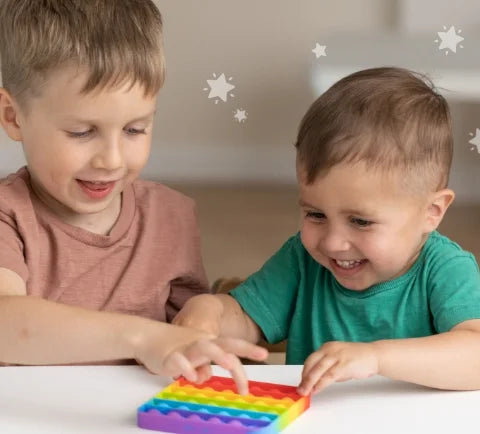How Do Senses Work for Preschoolers?
Senses are more than just seeing and hearing. Children absorb sensory information (or what they see and hear) from the environment around them, make sense of it, and use it to help them understand themselves. 1 The eight sensory systems that help children learn are the tactile system (touch), vestibular system (balance and movement), proprioception system (body awareness), visual (sight), olfactory (smell), auditory (hearing), gustatory (taste), and interoception (sense of hunger, pain, and temperature). 1 The sensory systems help your child identify what they like or don’t like and how they process things.
Why Is Sensory Development Important for Your Preschooler?
Children learn from their environments. As they start to use their senses for the first time, they may be a little unfamiliar with how to perceive sensory information. If your child processes sensory information poorly, they may not have a good sense of awareness on how their bodies take up space. 1 This can lead them to bump into objects or other people more often. 1 Children can also overreact to sensory inputs and become distressed at loud noises or underreact to sensations by not noticing pain. 1 Helping your child get used to sensory inputs that they find uncomfortable can be done through sensory activities in safe environments. 1
Multi-Sensory Activities to Try
Sensory activities can help encourage brain development, fine motor skill building, and language building in your preschooler. 2 Some fun multi-sensory activities to try include:
Guess What’s in the Jar
You can make a fun guessing game by putting some items in a jar and allowing your preschooler to guess what’s inside. Depending on what you put in the jar, you can help develop your child’s senses of smell and touch. Filling the jar with an object that makes noise when it’s shaken, such as beans, rice, bouncy balls, and buttons can engage their sense of hearing and allow them to identify certain sounds. 2 You can also add different smelling foods such as coffee, mint, lemons, herbs, or vanilla and cover the tops with a cloth to have your child guess the objects through their sense of smell. 1 This will also help them learn what smells they like and don’t like.
Play with Fun Textures
Different objects can have different textures, which can be especially fun for preschoolers to experience. Have your child play with various textures including fuzzy objects, bubble wrap, foam, sand, or water to let them get familiar with how things feel. 1 Playing with sensory objects such as play dough can also help with the development of gross motor skills. Incorporating some fun science experiments into your child’s day can help them learn things while they experience new textures.
Get Those Muscles & Joints Moving
The proprioception system provides information from the muscles and joints to tell us how much force to use for certain activities. 1 Encouraging your child to do exercises that require heavy work with muscles and joints can help them develop their proprioception system. 1 Some fun muscle and joint exercises include tug-o-war, moving through an obstacle course, playing with hand grippers, or moving a toy around the floor. 1
Play Music
Playing music can be a fun way to teach your child about processing sounds. Have your child listen to music and sing along to their favourite songs. 1 Be sure not to raise the volume of the music too high in order to protect your child’s hearing and to avoid overstimulation. Playing with a toy keyboard, drums, or other musical instruments are other fun ways to get your children to interact with sound. 1
Go Outside
So many senses can be discovered by going outside. The smell of flowers, the feeling of the breeze, the textures of leaves, and the sights of greenery can all be experienced just by stepping out the door. Encourage your child to play outdoors or go for supervised walks so they can get a sense of the world around them.
After a long day of multi-sensory activities, your preschooler deserves a healthy snack to satisfy their tummy. Serve up their favourite snacks along with a nutritional drink for kids like Enfagrow A+ to help support their brain development.
1. https://www.aboutkidshealth.ca/article?contentid=3890&language=english
2. https://www.calgarylibrary.ca/library-news/three-preschool-sensory-activities-that-explore-sound/





